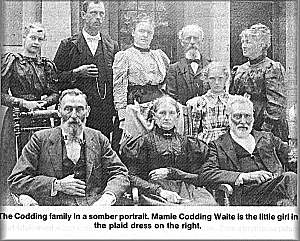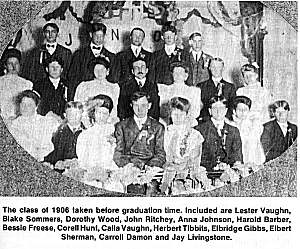 |
 |

|
A history of the community And its families
As published in the Brunswick Times Transcribed by Gerri Gornick)
It was March 19, 1855, when Henry Wait purchased 125 acres of land from S.W. Kelly in Brunswick. Henry had come from Strongsville to farm this land on what is now known as North Carpenter Road between Grafton and Boston Roads. Henry's property contained a log cabin, two barns and a sawmill. He married a widow, Helen Blakeslee Hurd, who had two children. They had three children of their own, Frank, Agnes and Jesse. Sometime during the next years, an "e" was added to the last name, forming the more familiar Waite name of Brunswick. Later, the small barn was converted to a home with two bedrooms downstairs and a loft upstairs. That sufficed until a larger home, which still stands, was built. Its hand hewn and partly sawn beams can be seen in the basement. Of the children, Frank married Alta Cartwright; Agnes married Clare Benjamin and Jess, who was just four when his father died, married the source of our information for this story, Mamie Codding, the adopted daughter of Spencer and Alvira Codding, also of Brunswick.  Both Jesse and Mamie were students at Brunswick Schools where they met. Jesse went on to work at his sister's grocery store in North Ridgeville. His records show that he worked 46 hours a week at 20 cents an hour and received his room and board. A good record keeper, his books take us back to the turn of the century when you would have found these commodities: canned goods, 10 cents each including corn, tomatoes, peas and pumpkin; tea cups, 4 cents apiece; crackers, 5 cents a pound; curry combs, 15 cents; whip crackers, 2 cents; oil cans, 3 gallons for 45 cents or 5 for 55 cents; salmon, 15 cents a can, 2 for 25 cents; coffee, 13 cents a pound; baker's chocolate, 25 cents; Cream of Wheat, 15 cents; currants, 12 cents; citron, 20 cents; cocoanut, 24 cents a pound; butter (St. Clair) 8 centers and (Erie) 11 cents; cocoa, 25 cents. In 1905, Jesse worked for Jake Keller on the thrashing machine for $1 a day and ran the family farm which he bought in 1908 from his brothers. Jesse also worked on the Buckeye Pipeline during the time of installation getting $4 per day for himself and a team of horses. For many years, the money from Keller helped the family finances. Mamie, when she went to high school, boarded with her aunt at the center of town because it was too far to travel each day. Some of the boys would ride their horses into town each day to attend school, housing them in the stables of the Methodist Church. Mamie, who graduated in the class of 1906 recalls those days. There were two rooms on the main floor of the school, the old town hall building which was on Route 42, with the floor upstairs used for meetings and entertainments such as the Grange, Farmer's Institute, etc., who would hold their meetings there. During recesses, the boys would play "duck on the rock" or baseball. In good weather, the girls would walk around the circle at the center. During inclement weather, they would have musical entertainment with everyone singing. The class of 1906 was the first senior class to hold a junior-senior banquet. It was held in the school-town hall and was prepared by the girls who brought items cooked at home from their farms, while the boys each paid 23 cents to offset costs. Menu included baked ham, fried chicken, potato salad, homemade rolls and butter, cake, ice cream and lemonade. A sense of humor prevailed even than. The girls laced the lemonade which was to go to the boys with salt instead of sugar and had a merry time as they took the first gulp.  Entertainment including singing "What do you do with a Drunken Sailer," "Jumbo Thru the Window," "Farmer in the Dell," "Drop the Handkerchief," and "Spin the Platter." Other forms of entertainment included plays and dances. After a square dance which ended at midnight, all would leave for home in horsedrawn buggies. When she was just a youngster, Mamie and her mother would attend town plays. There were also husking bees, oyster and chicken suppers to go. After her graduation, Mamie went to Medina where she took a test to teach. One could receive a certificate for one to five years of teaching according to the results of the test. And to get paid, you had to go to the township clerk with your certification to pick up your wages. Mamie began teaching at Linseder's Corners (Marks and Center) and boarded with Mr. and Mrs. Weiss and Walter and Mable Harrington. Mamie remembers a 10-inch snow on October 10 during those first years in which she still walked to school. A week's board was $2.50 and a good pair of shoes, an absolute necessity, was $3. Each teacher was her own janitor, stoking the stoves and sweeping floors with sawdust and disinfectant. A common water pail was used until that time, when children were urged to bring their own cups to avoid exchanging germs - but they still exchanged chewing gum and saved it each day by sticking it to the under side of the desks. The third year she taught in her home district, Goodman's Corners, where she could stay at home and was able to afford to hire someone to start the fire each morning for 15 cents. Ina Williams would come in to start the fire. One morning the leg of the stove fell off nearly causing havoc until a passerby was hailed to give aid. Seats were double and all rustic at the school. There was always a "scrabble," Mamie said, to see who would get the best desk. If someone was caught shoving, he stood in the corner holding his books till recess. Subjects included reading, writing, arithmetic, geography, grammar, spelling, physiology and history with five minute recitations and five minute question-answer periods. School was in session for eight months to accommodate farming families. In 1909, Jesse and Mamie were married and Mamie found she could make more than her $40 a month in wages by raising chickens. She used the proceeds from her enterprises (selling pullets and eggs for 9 cents a cozen) to fix up the house. The Waites had five children: Kathryn, born in 1911 has her own business in New York City; Harold, born in 1912 died of diphtheria at age nine; Ralph was born in 1914 and is a land developer in Florida; Charles was born in 1916 and lived on the family property; June was born in 1931 and lives in Strongsville. The boys were both excellent athletes in school, playing basketball and baseball for the town team. Charlie was catcher and Ralph was pitcher. He played both football and baseball at Ashland College and was picked up by the Welch, West Virginia, team to play baseball. Then he went to Canton and finally to Miami for the Boston Red Sox where he injured his arm. Meanwhile he married a West Virginia girl, Lalah Collier in 1939, teaching for some time before going into real estate. He has two children. Charlie graduated from high school and worked on the farm developing a herd of milk cows. He enlisted in 1941 and came home a staff sergeant in 1945. He married the former Ethel Heymeyer who was assistant postmaster and lived in the family home until his family outgrew the apartment. They built a home just south on the farm. When the farm was cut in two by I-71, it left the buildings on one side and 67 acres on the other, making it necessary to go around the road to reach the farm. He had switched to feeding cattle in the meantime and conditions became so bad he went to work for Ohio Nut and Bolt. They had four children, three of whom were married within six weeks of each other. Kurt is a farmer and also raises sheep now. June married Fred Krouple and had four children. Mamie spent each Sunday with June's family until she was into her 90's and Ether took her shopping. At 90 she was still active with the Garden Club, Senior Citizens Club, Bennett's Corners Methodist Church and its Women's Society, and would go once a month to Southwest General Hospital where she sewed and put in more than 500 volunteer hours. She and three friends, Mary Rogers, May Biesch and Estelle Clement would get together four times a year and have dinner out. Mamie traveled all over the U.S. including Hawaii and Alaska, missing just three states.
|